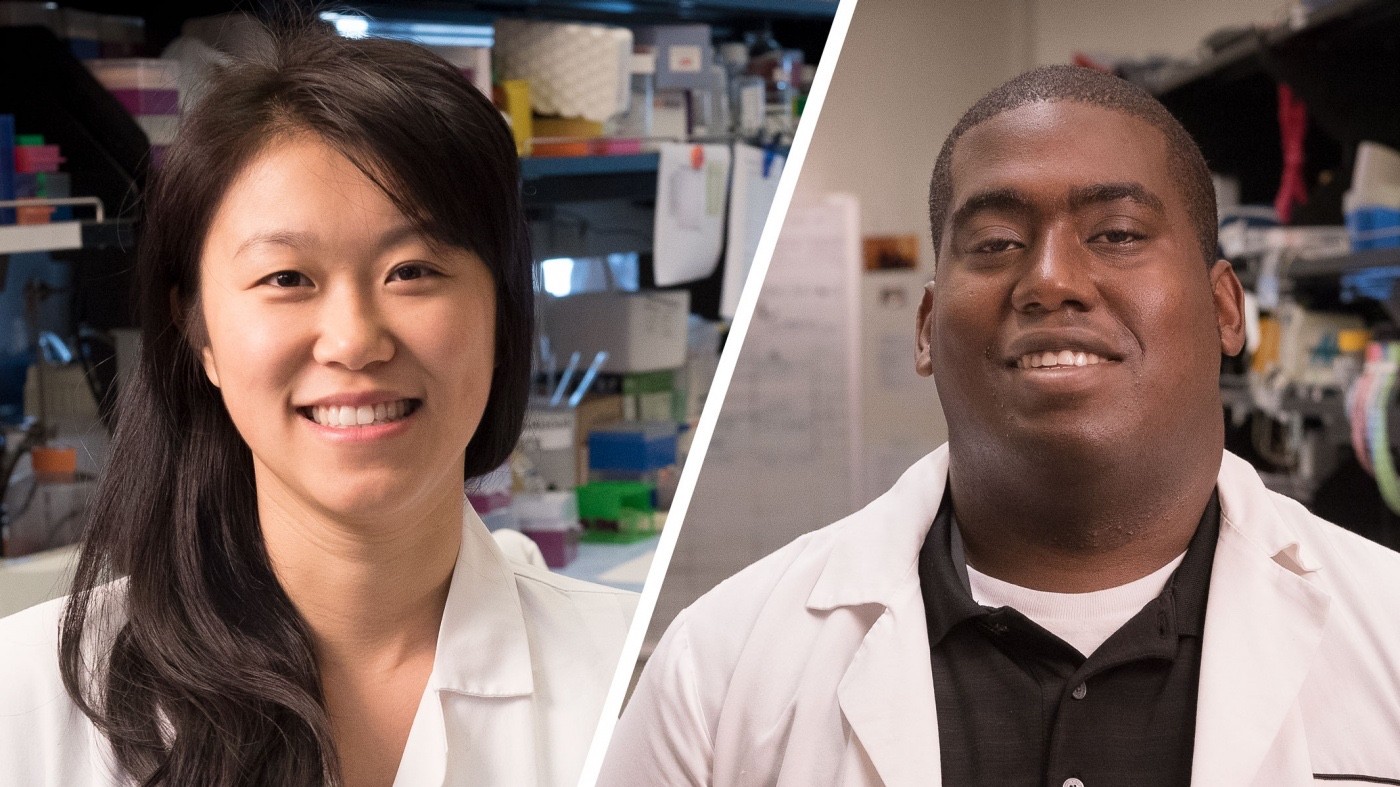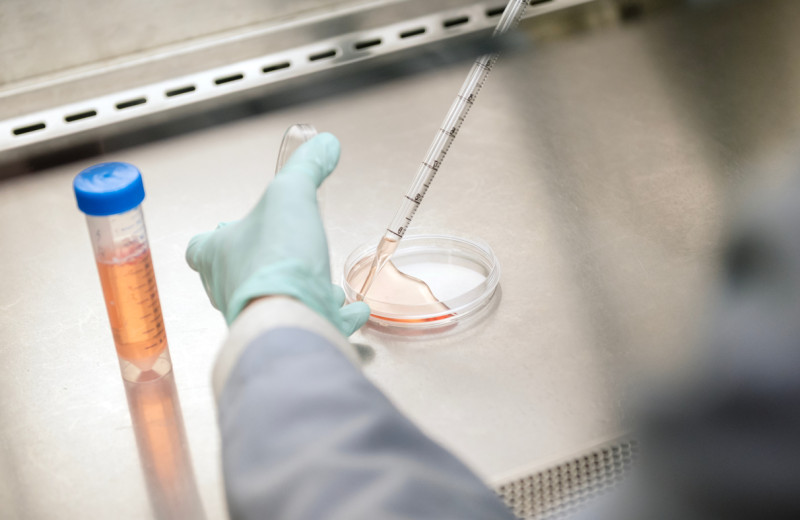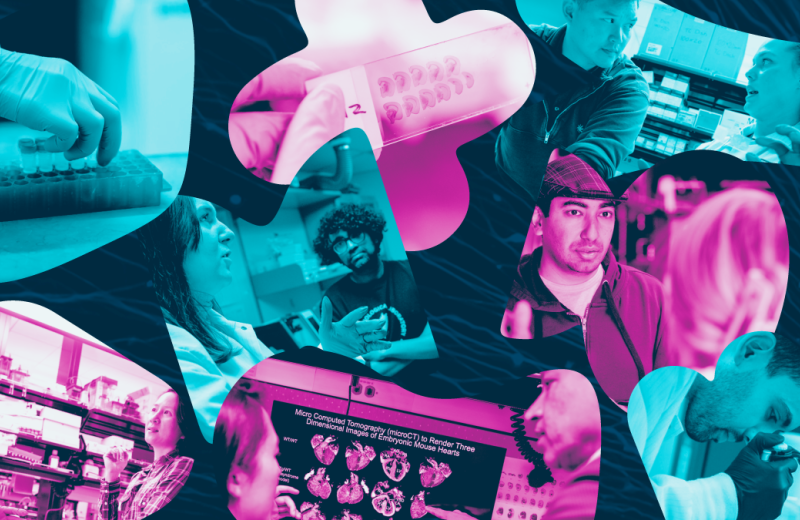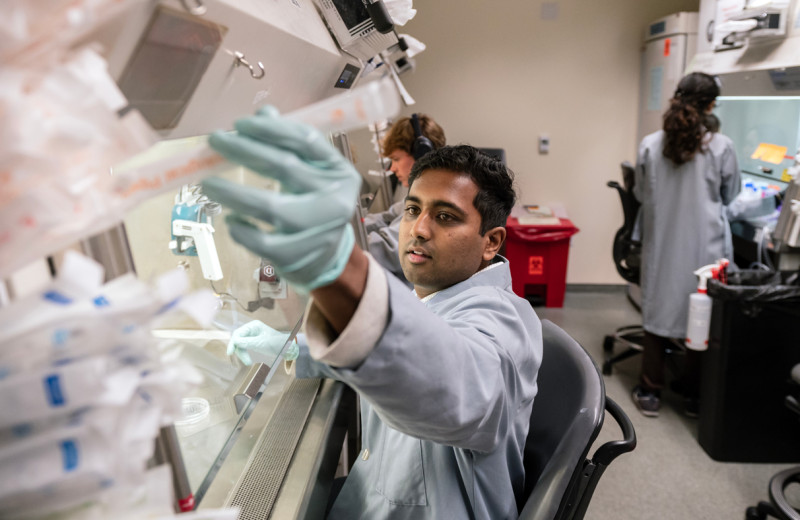Gladstone NOW: The Campaign Join Us on the Journey✕

Amy Wong (left) and Damon Williams (right) transferred to University of California campuses after completing two summer internships at Gladstone. [Photo: Chris Goodfellow, Gladstone Institutes]
In the 21st Century, science, technology, engineering, and mathematics (STEM) are more important than ever. Yet, while the demand for STEM professionals is high, the number of college students—particularly those from underrepresented and economically disadvantaged backgrounds—earning a degree in STEM fields is low.
To increase the number of students interested in STEM careers, especially in scientific and medical fields, the Gladstone Institutes supports summer internships for community college students through the Promoting Underrepresented Minorities Advancing in the Sciences (PUMAS) program. Since it was established in 2014, 16 students from underrepresented or challenging socio-economic backgrounds have participated in the PUMAS program. Two of those students completed more than one summer internship at Gladstone, and they continue to chart their course to a career in biomedical research.
A Glimpse into an Array of Biomedical Careers
Amy Wong participated in the PUMAS program for two summers. First, she worked under Hyungwook Lim, PhD, a postdoctoral scholar with Eric Verdin, PhD. Wong studied how the SIRT1 protein controls a type of immune cell called T helper cells, which have been linked to inflammation and autoimmune disorders, such as multiple sclerosis and arthritis. In 2015, she returned to Gladstone to study how genes of the HIV virus are turned on to make proteins under the mentorship of Daniela Boehm, PhD, a postdoctoral scholar in the laboratory of Melanie Ott, MD, PhD.
Wong grew up in San Francisco, and after high school, she took classes at local community colleges while caring for an ill family member. Last year, she transferred to the University of California (UC) Davis to work toward a bachelor’s degree in biotechnology, with an emphasis in bioinformatics.
“During my first summer at Gladstone, I attended a coding workshop, and I found it fun and interesting,” said Wong. “This workshop influenced my choice to focus on bioinformatics for my bachelor’s degree.”
Wong continues to do research in the Department of Chemistry at UC Davis, where she uses computer programs to study how different mutations affect glucosidase, an enzyme that breaks down complex carbohydrates, such as starch and glycogen.
“Interning at Gladstone showed me a side of science that most teachers don’t talk about,” said Wong. “It gave me a glimpse of what scientists do every day to find cures for diseases.”
After graduation from UC Davis, Amy plans to work in scientific research that aims to improve the quality of life of humans.
Getting a Jump on Human Biology
For former PUMAS student Damon Williams, two summers at Gladstone cemented his passion for biomedical research.
When Williams first joined the PUMAS program in 2014, he was a student at Los Medanos Community College in Pittsburg, California, where he also tutored students in calculus, organic chemistry, and molecular and cellular biology. He was already interested in a scientific career, but he didn’t know what life was like in a lab—until he joined Gladstone.
Williams first interned with Uma Lakshmanan, MS, a research associate in the Stem Cell Core, and Kathryn Ivey, PhD, director of the core. With their guidance, Williams transformed stem cells into skeletal muscle cells to help create a model of amyotrophic lateral sclerosis (ALS). Then, under Juan Pérez-Bermejo, MS, a graduate student with Bruce Conklin, MD, Williams studied protein aggregation, or clumps, linked to a heart disease called dilated cardiomyopathy. This disorder causes the walls of the left ventricle to thin and weaken so that the heart can’t pump blood as well as a healthy heart.
“Gladstone broadened my knowledge of biology and gave me a jump start on my college classes,” said Williams. “More importantly, it solidified my desire to work as a research associate in a lab studying immunology, stem cells, or neurological disease.”
Williams is now a junior at UC Riverside, where he is working toward a bachelor’s degree in cell, molecular, and developmental biology. In his spare time, he serves as a historian for the university’s DJ club, taking photos and videos and documenting them on social media.
Paving the Way to Higher Education
Wong and Williams are exemplary members of the PUMAS program, which supports community college students who plan to transfer to a four-year institution to pursue a bachelor’s degree in STEM.
“The PUMAS program provides students with more than exposure to Gladstone’s science and a variety of careers in biomedical research,” said Shannon Noonan, MS, education and community partnerships manager at Gladstone, who oversees the PUMAS program. “It also boosts their confidence in their ability to understand science, gives them a head start on their upper division courses, and helps them see themselves as researchers.”
Ott and Ivey established PUMAS through a grant funded by the National Heart, Lung, and Blood Institute of the National Institutes of Health that supports educational activities that enhance diversity in biomedical, behavioral, and clinical research.
“PUMAS was designed to give community college students experience working in biomedical research,” said Ott, a senior investigator at Gladstone. “I am delighted that the program has had such a strong impact on Amy and Damon, along with many of their summer internship peers.”
2016 PUMAS Participants and Mentors
Bereket H. Gebreslasie (mentored by Emilie Besnard, PhD, Verdin lab), Bozhong (Bobo) Hu (mentored by Tracy Hookway, PhD, McDevitt lab), Charrell Sherman (mentored by Alexandra Clemente, Paz lab), Diego Quintero (mentored by Irfan Kathiriya, MD, PhD, Bruneau lab; Patrick Devine, MD, PhD, Bruneau lab; and Meredith Calvert, PhD, Microscopy core), Hena Khairzadah (mentored by Emily Jones, Huang lab), Michael Sramek (mentored by Yvanka De Soysa, Srivastava lab), Stephanie Sanchez-Herrejon (mentored by Anthony Covarrubias, PhD, and Chris Carrico, PhD, Verdin lab).
Support Discovery Science
Your gift to Gladstone will allow our researchers to pursue high-quality science, focus on disease, and train the next generation of scientific thought leaders.
Gene Editing Strategy Could Treat Hundreds of Inherited Diseases More Effectively
Gene Editing Strategy Could Treat Hundreds of Inherited Diseases More Effectively
Scientists at Gladstone show the new method could treat the majority of patients with Charcot-Marie-Tooth disease.
News Release Research (Publication) Neurological Disease Conklin Lab CRISPR/Gene EditingGladstone’s Scientific Highlights of 2025
Gladstone’s Scientific Highlights of 2025
From fundamental insights to translational advances, here’s how Gladstone researchers moved science forward in 2025.
Gladstone Experts Alzheimer’s Disease Autoimmune Diseases COVID-19 Neurological Disease Genomic Immunology Cardiovascular Disease Data Science and Biotechnology Infectious Disease Conklin LabThe Genome Editing Playbook Is Different in Neurons
The Genome Editing Playbook Is Different in Neurons
The striking findings of a new study could influence how gene therapies are designed for many genetic diseases.
News Release Research (Publication) Neurological Disease Conklin Lab Doudna Lab CRISPR/Gene Editing



